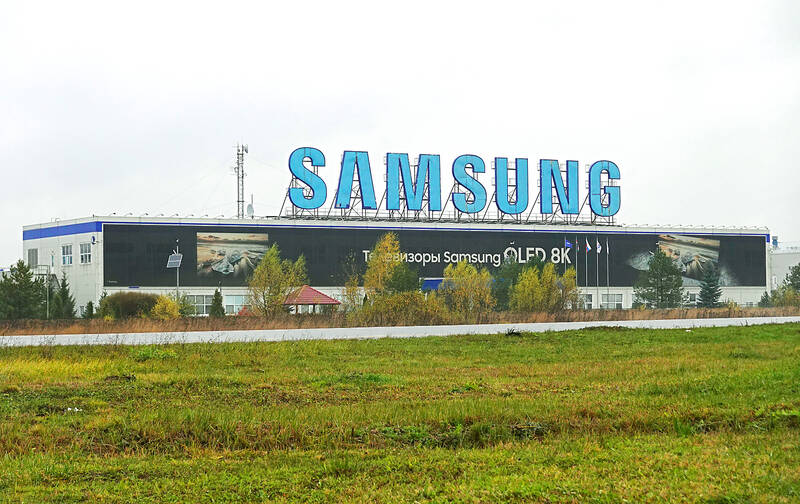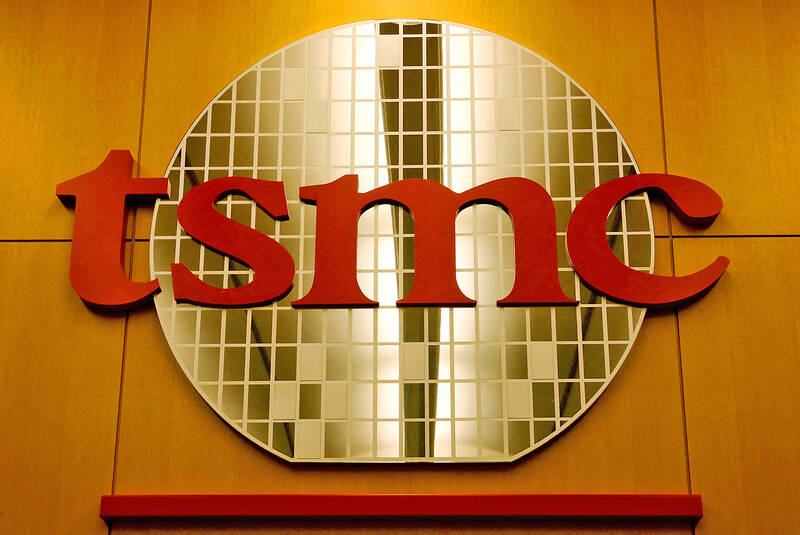Taiwan and South Korea, two of Asia’s most tech-heavy economies, are facing an uphill battle in trying to stem losses in some of the world’s worst-performing assets this year.
The two countries are hit particularly hard by a global growth slowdown and US chip restrictions.
Authorities are stepping up actions, including introducing curbs on short selling, readying market stabilization funds to buy assets and intervening in currency markets in moves reminiscent of the early days of the COVID-19 pandemic.

Photo: EPA-EFE
While markets everywhere have seen gut-wrenching moves in reaction to accelerating inflation, aggressive central bank rate hikes and a soaring US dollar, Taiwan and South Korea look especially vulnerable among major economies. Both are highly dependent on exports for growth, and are swayed by global demand for chips. Adding to their woes is the impact of new US curbs on supply chains linked to China’s semiconductor industry.
The interventions have not stopped the declines. Taiwan’s equity benchmark has dropped about 8 percent since a support fund was activated in July, and South Korean shares were down 11 percent in the past two months, leaving stock gauges in the two markets more than 25 percent lower this year.
The New Taiwan dollar and the won are also among the biggest losers in the world against the greenback this year to date.

Photo: Tyrone Siu, Reuters
“These stabilization measures are intended to buy enough time until the tech cycle bottoms out and foreign investors return,” Modular Asset Management Pte Ltd strategist Wai Ho Leong (梁偉豪) said. “Turning markets around is a different matter.”
In Taipei, the central bank last week warned of “severe economic challenges” for next year, while South Korea recorded its longest string of trade deficits since the 1997-1998 Asian financial crisis.
Amid these headwinds, analysts have cut their earnings estimates for South Korea’s SK Hynix Inc and Samsung Electronics Co to the lowest in more than two years.
While the chipmakers have won approval from the US to keep ordering US equipment for their plants in China for one year, concerns swirl around their business models as the US seeks to curb China’s self sufficiency and advancement in military capabilities.
A recessionary environment in the West and China’s “zero COVID-19” policy are also having knock-on effects.
South Korea’s chief economic policymakers, including the central bank governor and finance minister, were to meet yesterday to look into ways to calm the local credit market, the South Korean central bank said in a text message late on Saturday.
The meeting scheduled at about midday was the highest-level policy discussion since yields surged to decade-highs and default risks spread, prompting authorities to revive a 1.6 trillion won (US$1.1 billion) bond stabilization fund earlier this month.
“In the near term we remain cautious on Asian stocks, in particular on stocks or equity markets that are exposed to external growth, such as Korea,” and tech hardware firms, Nomura Holdings Inc strategists including Chetan Seth wrote in a recent note.
Taiwan Semiconductor Manufacturing Co (台積電) and Samsung account for the biggest weights on the TAIEX and South Korea’s KOSPI respectively.
Taiwan and South Korea are not alone in supporting markets.
Japan has intervened in the currency market to stem the yen’s decline, but it failed to prevent the currency’s plunge to a 32-year low. China is easing restrictions on mutual funds’ purchases to back its plunging stock market.
To be sure, slumping valuations in Taiwan and South Korea are proving attractive for some, and could spark short-term relief rallies.
Foreign investors snapped up South Korean shares for 13 straight days this month, and Morgan Stanley is among the outliers calling an end to the underperformance of Asian technology stocks as it sees most risks as priced in.
Others remain skeptical that the export-reliant economies would pick up anytime soon, and some favor Asian markets that are backed by strong domestic demand and a revival in tourism, such as India and Indonesia.
“It’s going to be a long winter and these support measures will probably not be enough,” said Ken Peng (彭墾), head of Asia investment strategy at Citigroup Inc’s private banking arm, referring to actions from Taiwanese and South Korean authorities. “A recovery will likely have to wait until the USD peaks and rolls over, likely when non-US growth is expected to recover.”

CHIP RACE: Three years of overbroad export controls drove foreign competitors to pursue their own AI chips, and ‘cost US taxpayers billions of dollars,’ Nvidia said China has figured out the US strategy for allowing it to buy Nvidia Corp’s H200s and is rejecting the artificial intelligence (AI) chip in favor of domestically developed semiconductors, White House AI adviser David Sacks said, citing news reports. US President Donald Trump on Monday said that he would allow shipments of Nvidia’s H200 chips to China, part of an administration effort backed by Sacks to challenge Chinese tech champions such as Huawei Technologies Co (華為) by bringing US competition to their home market. On Friday, Sacks signaled that he was uncertain about whether that approach would work. “They’re rejecting our chips,” Sacks

NATIONAL SECURITY: Intel’s testing of ACM tools despite US government control ‘highlights egregious gaps in US technology protection policies,’ a former official said Chipmaker Intel Corp has tested chipmaking tools this year from a toolmaker with deep roots in China and two overseas units that were targeted by US sanctions, according to two sources with direct knowledge of the matter. Intel, which fended off calls for its CEO’s resignation from US President Donald Trump in August over his alleged ties to China, got the tools from ACM Research Inc, a Fremont, California-based producer of chipmaking equipment. Two of ACM’s units, based in Shanghai and South Korea, were among a number of firms barred last year from receiving US technology over claims they have

It is challenging to build infrastructure in much of Europe. Constrained budgets and polarized politics tend to undermine long-term projects, forcing officials to react to emergencies rather than plan for the future. Not in Austria. Today, the country is to officially open its Koralmbahn tunnel, the 5.9 billion euro (US$6.9 billion) centerpiece of a groundbreaking new railway that will eventually run from Poland’s Baltic coast to the Adriatic Sea, transforming travel within Austria and positioning the Alpine nation at the forefront of logistics in Europe. “It is Austria’s biggest socio-economic experiment in over a century,” said Eric Kirschner, an economist at Graz-based Joanneum

OPTION: Uber said it could provide higher pay for batch trips, if incentives for batching is not removed entirely, as the latter would force it to pass on the costs to consumers Uber Technologies Inc yesterday warned that proposed restrictions on batching orders and minimum wages could prompt a NT$20 delivery fee increase in Taiwan, as lower efficiency would drive up costs. Uber CEO Dara Khosrowshahi made the remarks yesterday during his visit to Taiwan. He is on a multileg trip to the region, which includes stops in South Korea and Japan. His visit coincided the release last month of the Ministry of Labor’s draft bill on the delivery sector, which aims to safeguard delivery workers’ rights and improve their welfare. The ministry set the minimum pay for local food delivery drivers at